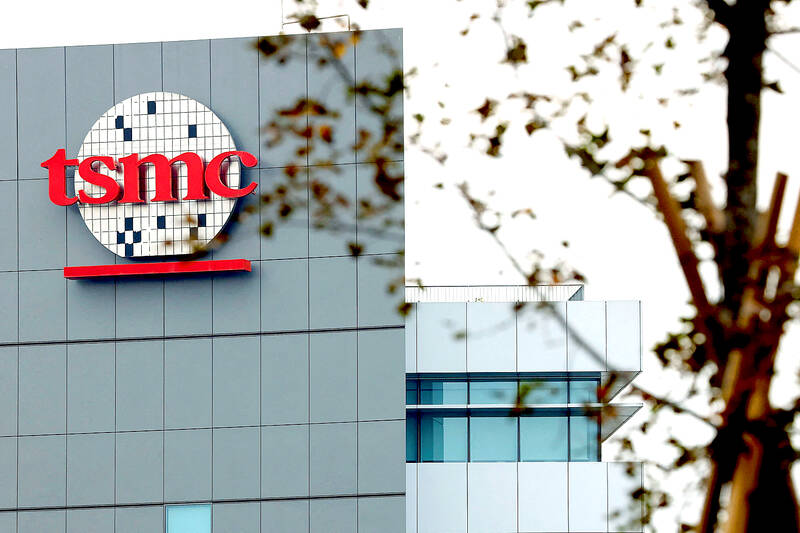Taiwan Semiconductor Manufacturing Co (TSMC, 台積電), the world’s biggest contract chipmaker, is in talks to receive German government subsidies for as much as 50 percent of the costs to build a new semiconductor fab in the country, people familiar with the matter said.
The government is in ongoing negotiations with TSMC, as well as its partners on the project — Bosch Ltd, NXP Semiconductors NV and Infineon Technologies AG — the people said, asking not to be identified because the deliberations are private.
No final decisions have been made and the final subsidy amount could still change. Any state aid must also be signed off by the European Commission.

Photo: Ann Wang, Reuters
The deliberations over the Dresden plant, which could cost as much as 10 billion euros (US$10.7 billion) to build, show how competition for semiconductor manufacturing capacity has intensified. The top end of the subsidies being discussed would put German government support for the fab on par with what Japan is offering TSMC to build a factory there. It would also outpace the 40 percent maximum that most other chipmakers are getting for their plants in Europe.
The German Ministry for Economic Affairs and Climate Action said in a statement that it is in a “close exchange” with TSMC “with the aim of jointly discussing prerequisites for an investment decision.”
The ministry did not comment on the subsidies beyond saying that the government could fund the project under the European Chips Act.
A spokeswoman for TSMC said that the company is evaluating the possibility of building a fab in Europe and declined to comment further.
TSMC chief executive C.C. Wei (魏哲家) last month said that the decision would be based on demand from customers and the level of support from Beijing.
The plant would be a big win for the EU’s 43 billion euro Chips Act, which is aimed at increasing domestic output to avoid supply chain disruptions. STMicroelectronics NV, GlobalFoundries Inc, Infineon Technologies AG and Wolfspeed Inc are among the chipmakers that have announced new investments in Europe since it was first proposed last year.
“The goal is to be close to our customers,” TSMC senior vice president Kevin Zhang (張曉強) said at an industry event in Amsterdam this week.
TSMC’s board would make a final decision about going ahead with the project as soon as August, he said.
“If we do build a fab in Dresden, likely we would start at the 28-nanometer generation,” he said.
Such chips could be used for microcontrollers in vehicles and could be made smaller.

SELL-OFF: Investors expect tariff-driven volatility as the local boarse reopens today, while analysts say government support and solid fundamentals would steady sentiment Local investors are bracing for a sharp market downturn today as the nation’s financial markets resume trading following a two-day closure for national holidays before the weekend, with sentiment rattled by US President Donald Trump’s sweeping tariff announcement. Trump’s unveiling of new “reciprocal tariffs” on Wednesday triggered a sell-off in global markets, with the FTSE Taiwan Index Futures — a benchmark for Taiwanese equities traded in Singapore — tumbling 9.2 percent over the past two sessions. Meanwhile, the American depositary receipts (ADRs) of Taiwan Semiconductor Manufacturing Co (TSMC, 台積電), the most heavily weighted stock on the TAIEX, plunged 13.8 percent in

A wave of stop-loss selling and panic selling hit Taiwan's stock market at its opening today, with the weighted index plunging 2,086 points — a drop of more than 9.7 percent — marking the largest intraday point and percentage loss on record. The index bottomed out at 19,212.02, while futures were locked limit-down, with more than 1,000 stocks hitting their daily drop limit. Three heavyweight stocks — Taiwan Semiconductor Manufacturing Co (TSMC, 台積電), Hon Hai Precision Industry Co (Foxconn, 鴻海精密) and MediaTek (聯發科) — hit their limit-down prices as soon as the market opened, falling to NT$848 (US$25.54), NT$138.5 and NT$1,295 respectively. TSMC's

TARIFFS: The global ‘panic atmosphere remains strong,’ and foreign investors have continued to sell their holdings since the start of the year, the Ministry of Finance said The government yesterday authorized the activation of its NT$500 billion (US$15.15 billion) National Stabilization Fund (NSF) to prop up the local stock market after two days of sharp falls in reaction to US President Donald Trump’s new import tariffs. The Ministry of Finance said in a statement after the market close that the steering committee of the fund had been given the go-ahead to intervene in the market to bolster Taiwanese shares in a time of crisis. The fund has been authorized to use its assets “to carry out market stabilization tasks as appropriate to maintain the stability of Taiwan’s

In a small town in Paraguay, a showdown is brewing between traditional producers of yerba mate, a bitter herbal tea popular across South America, and miners of a shinier treasure: gold. A rush for the precious metal is pitting mate growers and indigenous groups against the expanding operations of small-scale miners who, until recently, were their neighbors, not nemeses. “They [the miners] have destroyed everything... The canals, springs, swamps,” said Vidal Britez, president of the Yerba Mate Producers’ Association of the town of Paso Yobai, about 210km east of capital Asuncion. “You can see the pollution from the dead fish.